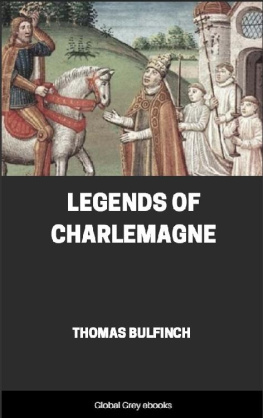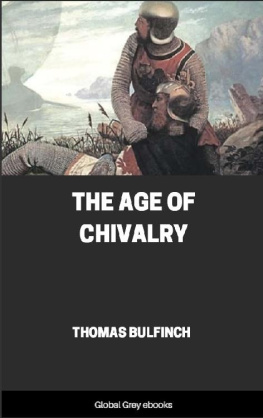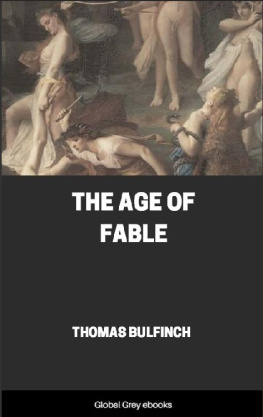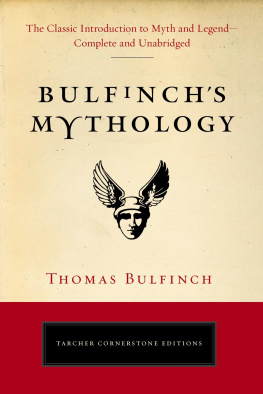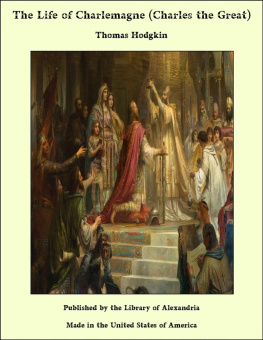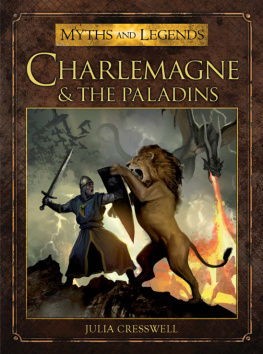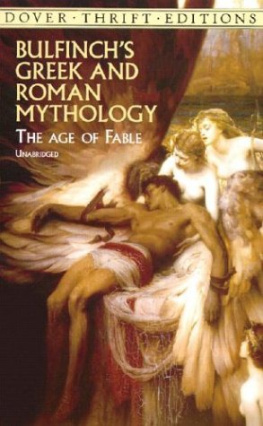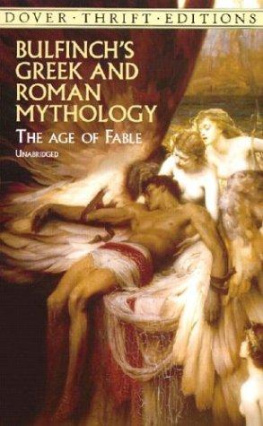Thomas Bulfinch - Legends of Charlemagne
Here you can read online Thomas Bulfinch - Legends of Charlemagne full text of the book (entire story) in english for free. Download pdf and epub, get meaning, cover and reviews about this ebook. year: 2018, publisher: Global Grey ebooks, genre: Non-fiction. Description of the work, (preface) as well as reviews are available. Best literature library LitArk.com created for fans of good reading and offers a wide selection of genres:
Romance novel
Science fiction
Adventure
Detective
Science
History
Home and family
Prose
Art
Politics
Computer
Non-fiction
Religion
Business
Children
Humor
Choose a favorite category and find really read worthwhile books. Enjoy immersion in the world of imagination, feel the emotions of the characters or learn something new for yourself, make an fascinating discovery.
- Book:Legends of Charlemagne
- Author:
- Publisher:Global Grey ebooks
- Genre:
- Year:2018
- Rating:3 / 5
- Favourites:Add to favourites
- Your mark:
- 60
- 1
- 2
- 3
- 4
- 5
Legends of Charlemagne: summary, description and annotation
We offer to read an annotation, description, summary or preface (depends on what the author of the book "Legends of Charlemagne" wrote himself). If you haven't found the necessary information about the book — write in the comments, we will try to find it.
Legends of Charlemagne — read online for free the complete book (whole text) full work
Below is the text of the book, divided by pages. System saving the place of the last page read, allows you to conveniently read the book "Legends of Charlemagne" online for free, without having to search again every time where you left off. Put a bookmark, and you can go to the page where you finished reading at any time.
Font size:
Interval:
Bookmark:
BULFINCH'S MYTHOLOGY
LEGENDS OF CHARLEMAGNE
BY
THOMAS BULFINCH
1863
Bulfinch's Mythology, Legends of Charlemagne by Thomas Bulfinch.
This edition was created and published by Global Grey
GlobalGrey 2018

globalgreyebooks.com
THOSE who have investigated the origin of the romantic fables relating to Charlemagne and his peers are of opinion that the deeds of Charles Martel, and perhaps of other Charleses, have been blended in popular tradition with those properly belonging to Charlemagne. It was indeed a most momentous era; and if our readers will have patience, before entering on the perusal of the fabulous annals which we are about to lay before them, to take a rapid survey of the real history of the times, they will find it hardly less romantic than the tales of the poets.
In the century beginning from the year 600, the countries bordering upon the native land of our Saviour, to the east and south, had not yet received his religion. Arabia was the seat of an idolatrous religion resembling that of the ancient Persians, who worshipped the sun, moon, and stars. In Mecca, in the year 571, Mahomet was born, and here, at the age of forty, he proclaimed himself the prophet of God, in dignity as superior to Christ as Christ had been to Moses. Having obtained by slow degrees a considerable number of disciples, he resorted to arms to diffuse his religion. The energy and zeal of his followers, aided by the weakness of the neighboring nations, enabled him and his successors to spread the sway of Arabia and the religion of Mahomet over the countries to the east as far as the Indus, northward over Persia and Asia Minor, westward over Egypt and the southern shores of the Mediterranean, and thence over the principal portion of Spain. All this was done within one hundred years from the Hegira, or flight of Mahomet from Mecca to Medina, which happened in the year 622, and is the era from which Mahometans reckon time, as we do from the birth of Christ.
From Spain the way was open for the Saracens (so the followers of Mahomet were called) into France, the conquest of which, if achieved, would have been followed very probably by that of all the rest of Europe, and would have resulted in the banishment of Christianity from the earth. For Christianity was not at that day universally professed, even by those nations which we now regard as foremost in civilization. Great part of Germany, Britain, Denmark, and Russia were still pagan or barbarous.
At that time there ruled in France, though without the title of king, the first of those illustrious Charleses of whom we have spoken, Charles Martel, the grandfather of Charlemagne. The Saracens of Spain had made incursions into France in 712 and 718, and had retired, carrying with them a vast booty. In 725, Anbessa, who was then the Saracen governor of Spain, crossed the Pyrenees with a numerous army, and took by storm the strong town of Carcassone. So great was the terror, excited by this invasion, that the country for a wide extent submitted to the conqueror, and a Mahometan governor for the province was appointed and installed at Narbonne. Anbessa, however, received a fatal wound in one of his engagements, and the Saracens, being thus checked from further advance, retired to Narbonne.
In 732 the Saracens again invaded France under Abdalrahman, advanced rapidly to the banks of the Garonne, and laid siege to Bordeaux. The city was taken by assault and delivered up to the soldiery. The invaders still pressed forward, and spread over the territories of Orleans, Auxerre, and Sens. Their advanced parties were suddenly called in by their chief, who had received information of the rich abbey of St. Martin of Tours, and resolved to plunder and destroy it.
Charles during all this time had done nothing to oppose the Saracens, for the reason that the portion of France over which their incursions had been made was not at that time under his dominion, but constituted an independent kingdom, under the name of Aquitaine, of which Eude was king. But now Charles became convinced of the danger, and prepared to encounter it. Abdalrahman was advancing toward Tours, when intelligence of the approach of Charles, at the head of an army of Franks, compelled him to fall back upon Poitiers, in order to seize an advantageous field of battle.
Charles Martel had called together his warriors from every part of his dominion, and, at the head of such an army as had hardly ever been seen in France, crossed the Loire, probably at Orleans, and, being joined by the remains of the army of Aquitaine, came in sight of the Arabs in the month of October, 732. The Saracens seem to have been aware of the terrible enemy they were now to encounter, and for the first time these formidable conquerors hesitated. The two armies remained in presence during seven days before either ventured to begin the attack; but at length the signal for battle was given by Abdalrahman, and the immense mass of the Saracen army rushed with fury on the Franks. But the heavy line of the Northern warriors remained like a rock, and the Saracens, during nearly the whole day, expended their strength in vain attempts to make an impression upon them. At length, about four oclock in the afternoon, when Abdalrahman was preparing for a new and desperate attempt to break the line of the Franks, a terrible clamor was heard in the rear of the Saracens. It was King Eude, who, with his Aquitanians, had attacked their camp, and a great part of the Saracen army rushed tumultuously from the field to protect their plunder. In this moment of confusion the line of the Franks advanced, and, sweeping the field before it, carried fearful slaughter amongst the enemy. Abdalrahman made desperate efforts to rally his troops, but when he himself, with the bravest of his officers, fell beneath the swords of the Christians, all order disappeared, and the remains of his army sought refuge in their immense camp, from which Eude and his Aquitanians had been repulsed. It was now late, and Charles, unwilling to risk an attack on the camp in the dark, withdrew his army, and passed the night in the plain, expecting to renew the battle in the morning.
Accordingly, when daylight came, the Franks drew up in order of battle, but no enemy appeared; and when at last they ventured to approach the Saracen camp, they found it empty. The invaders had taken advantage of the night to begin their retreat, and were already on their way back to Spain, leaving their immense plunder behind to fall into the hands of the Franks.
This was the celebrated battle of Tours, in which vast numbers of the Saracens were slain, and only fifteen hundred of the Franks. Charles received the surname of Martel (the Hammer) in consequence of this victory.
The Saracens, notwithstanding this severe blow, continued to hold their ground in the South of France; but Pepin, the son of Charles Martel, who succeeded to his fathers power, and assumed the title of king, successively took from them the strong places they held; and in 759, by the capture of Narbonne, their capital, extinguished the remains of their power in France.
Charlemagne, or Charles the Great, succeeded his father, Pepin, on the throne in the year 768. This prince, though the hero of numerous romantic legends, appears greater in history than in fiction. Whether we regard him as a warrior or as a legislator, as a patron of learning or as the civilizer of a barbarous nation, he is entitled to our warmest admiration. Such he is in history; but the romancers represent him as often weak and passionate, the victim of treacherous counsellors, and at the mercy of turbulent barons, on whose prowess he depends for the maintenance of his throne. The historical representation is doubtless the true one, for it is handed down in trustworthy records, and is confirmed by the events of the age. At the height of his power, the French empire extended over what we now call France, Germany, Switzerland, Holland, Belgium, and a great part of Italy.
Next pageFont size:
Interval:
Bookmark:
Similar books «Legends of Charlemagne»
Look at similar books to Legends of Charlemagne. We have selected literature similar in name and meaning in the hope of providing readers with more options to find new, interesting, not yet read works.
Discussion, reviews of the book Legends of Charlemagne and just readers' own opinions. Leave your comments, write what you think about the work, its meaning or the main characters. Specify what exactly you liked and what you didn't like, and why you think so.

